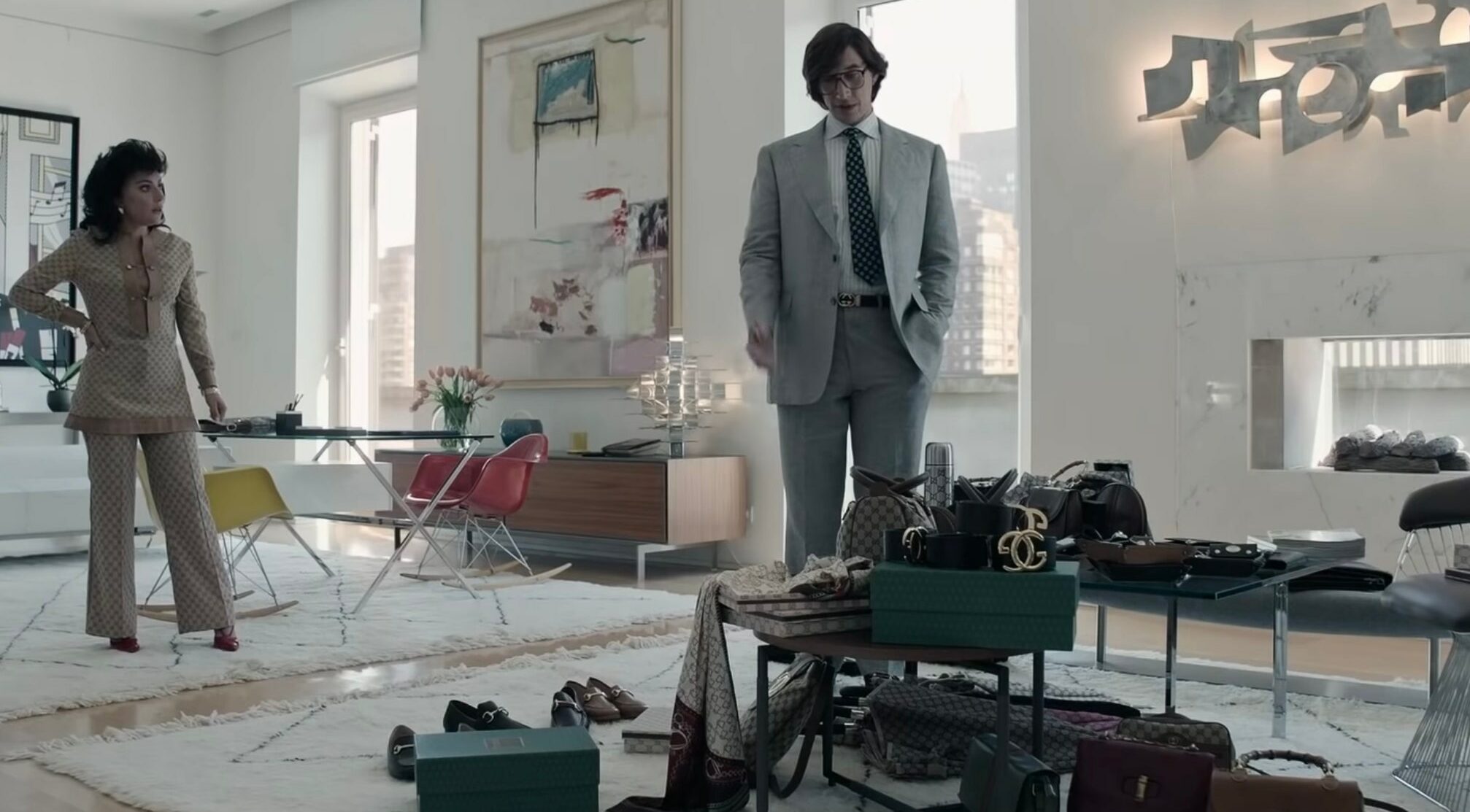
The acting is ostentatious in House of Gucci.
Often, but not always.
Other times the acting isn’t ostentatious at all. It’s quite reserved. Multiple times throughout the film, characters discuss roles they play, how they perform, the image they desire to present to the world. At one point, one member of the Gucci family even cautions another that people who loudly advertise their supposed quality are those least likely to truly posses it.
House of Gucci is a movie about a brand and how the custodians of that brand, the bearers of the name itself, behave, either in service to that brand or in service to a more deeply rooted sense of self, if they have one.
Jared Leto plays the biggest character in House of Gucci. His Paolo Gucci is hilariously colorful. Paolo is also the Gucci most consumed with the idea of his surname. He is nothing but the brand. His father, Aldo, is played by Al Pacino. Pacino certainly knows how to take a chunk out of the scenery, and he swallows a bellyful here. Paolo is always “on” while Aldo performs the Gucci stereotype as the situation calls for it. He meets the moment. Also just happens to almost always be in a moment he needs to meet.
Patrizia Reggiani—she would hate us calling her that; she would insist on being called a Gucci—aspires to the Gucci name. Lady Gaga navigates this aspiration and the accompanying acting modulation between caricatured and naturalistic acting very well. She is finally eaten up by her ambition, consumed by her assumption of an image.
Adam Driver, playing Maurizio Gucci, Patrizia’s doomed husband, contrasts Maurizio with his other family members by being almost comically reserved. He is so resistant to the trap of the Gucci brand, he pulls everything back. He is repressed. When he does finally let his hair down he seems inauthentic. It’s like a final cry for liberation, a desperate fit to get others to force him out of the prison of inauthenticity he was born into, a tactic he has tried before. He succeeds?
Acting is one of those things that most often is difficult to clearly see in movies. Most acting is so good we don’t notice it. We accept the characters as real and forget they are being performed by actors making choices. House of Gucci doesn’t let us do that. It doesn’t want us to do that. It is all about performance.
In a time in which “personal branding” has become a significant aspect of many people’s social lives thanks to the social media sphere, this is a meaningful theme. We are tempted to laugh at this Gucci family, at the ways avarice, vanity, and pride destroy them, but we are different from them only by degree, not by kind. I shared a Thanksgiving dinner with a former reality TV star who now aspires to be an “influencer.” She’s a lesser kind of Gucci, but still a Gucci. I just told you about it to prop up my own brand. I am a lesser Gucci still. To put it in terms of the Gucci brand, we are not knockoffs of the real thing. We are all the same thing. The only difference between the Guccis and the rest of us is the price we can charge for our handbags.
The acting is ostentatious in House of Gucci.
Often, but not always.
Other times the acting isn’t ostentatious at all. It’s quite reserved. Multiple times throughout the film, characters discuss roles they play, how they perform, the image they desire to present to the world. At one point, one member of the Gucci family even cautions another that people who loudly advertise their supposed quality are those least likely to truly posses it.
House of Gucci is a movie about a brand and how the custodians of that brand, the bearers of the name itself, behave, either in service to that brand or in service to a more deeply rooted sense of self, if they have one.
Jared Leto plays the biggest character in House of Gucci. His Paolo Gucci is hilariously colorful. Paolo is also the Gucci most consumed with the idea of his surname. He is nothing but the brand. His father, Aldo, is played by Al Pacino. Pacino certainly knows how to take a chunk out of the scenery, and he swallows a bellyful here. Paolo is always “on” while Aldo performs the Gucci stereotype as the situation calls for it. He meets the moment. Also just happens to almost always be in a moment he needs to meet.
Patrizia Reggiani—she would hate us calling her that; she would insist on being called a Gucci—aspires to the Gucci name. Lady Gaga navigates this aspiration and the accompanying acting modulation between caricatured and naturalistic acting very well. She is finally eaten up by her ambition, consumed by her assumption of an image.
Adam Driver, playing Maurizio Gucci, Patrizia’s doomed husband, contrasts Maurizio with his other family members by being almost comically reserved. He is so resistant to the trap of the Gucci brand, he pulls everything back. He is repressed. When he does finally let his hair down he seems inauthentic. It’s like a final cry for liberation, a desperate fit to get others to force him out of the prison of inauthenticity he was born into, a tactic he has tried before. He succeeds?
Acting is one of those things that most often is difficult to clearly see in movies. Most acting is so good we don’t notice it. We accept the characters as real and forget they are being performed by actors making choices. House of Gucci doesn’t let us do that. It doesn’t want us to do that. It is all about performance.
In a time in which “personal branding” has become a significant aspect of many people’s social lives thanks to the social media sphere, this is a meaningful theme. We are tempted to laugh at this Gucci family, at the ways avarice, vanity, and pride destroy them, but we are different from them only by degree, not by kind. I shared a Thanksgiving dinner with a former reality TV star who now aspires to be an “influencer.” She’s a lesser kind of Gucci, but still a Gucci. I just told you about it to prop up my own brand. I am a lesser Gucci still. To put it in terms of the Gucci brand, we are not knockoffs of the real thing. We are all the same thing. The only difference between the Guccis and the rest of us is the price we can charge for our handbags.

Elijah Davidson is Co-Director of Brehm Film and Senior Film Critic. Find more of his work at elijahdavidson.com.
There is something inherently, necessarily myopic about the creative process where an artist has to focus on their unique work to such a degree that it’s easy to lose sight of the web of loving relationships that surround and support them.